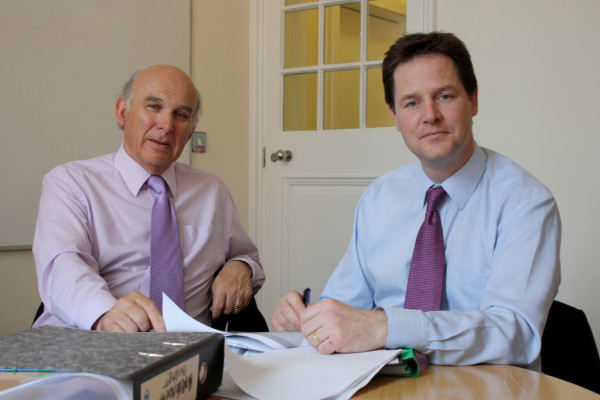Parties in coalitions find themselves caught between the need to cooperate and differentiate
The UK’s first coalition government during peacetime since 1945 ended with the electoral decimation of the Liberal Democrats at the 2015 election, with the party seemingly punished for its inability to create a compelling justification for its 2010 voters to back them again in the post-Coalition UK political landscape. Here, Inaki Sagarzazu and Heike Kluever show that the dilemma for coalition partners is finding an appropriate balance between the incompatible needs to cooperate and differentiate.

Differentiation and Collaboration? (Credit: David Angell, CC BY 2.0)
Coalition governments, while uncommon in the UK, are the norm in many countries in Europe and in many other democracies across the world. Where coalition politics prevail, political parties need to learn to navigate the turbulent waters that governing in coalitions entails. In the UK, for instance, the Liberal Democrats (Lib Dems) had to learn this the hard way by losing a significant policy initiative –electoral reform – and a significant number of local councilors in the 2011 election and 49 MPs in the 2015 election.
One of the biggest problems the Lib Dems faced was that voters perceived them as being indistinguishable from the Conservatives. The Lib Dems found it extremely difficult to sufficiently differentiate themselves from their senior partners, and as such suffered a terrible blow in terms of the loss of their political support. However, if differentiating from your coalition partner(s) is the key to surviving a coalition government electorally, then how can you balance the electoral imperative with the imperative to effectively govern together with your coalition partner?
This question poses an interesting dilemma as coalition parties have to balance two contrasting forces. On the one hand they need to work together in order to effectively promote their common legislative agenda and maintain the stability of the Cabinet. Working together means that coalition parties need to reach policy compromises and also be able to communicate a joint view of where the country is headed. Simultaneously, coalition parties face electoral pressures to differentiate from their partner in order to signal their own policy profile to voters. After all, if there is no difference between the parties in a coalition, what is the incentive for the voters who elected the junior partner to do so again? This electoral incentive runs counter to the governing incentive, as the latter calls for unity while the former calls for differentiation.
In a way, the good thing about coalitions is that usually –although not always- that the electoral calendar is known ahead of time. From the moment of the election, coalition parties have a good idea of when the next parliamentary election will be held. As such they can plan a communications and governing strategy that allows for balancing these two imperatives. Research shows that parties in coalition governments go through three periods in terms of their political communication strategy.
During the election parties ran carefully designed election campaigns where they selectively focused on policy issues on which they had an advantage to mobilize voters. At the beginning of the legislative term immediately following the election, coalition parties have to change from election mode to governing mode. At this stage, issue differentiation between coalition parties will continue for a while. This will be the case for three reasons;
- First, coalition parties cannot change their policy preferences immediately. Having campaigned for months on specific policy initiatives parties cannot simply abandon these as this would risk hurting their credibility and disappointing their voters. Second, coalition parties have an incentive to signal compliance with their commitments to voters by enacting their election promises right at the beginning of the term as media attention and public monitoring is still high at this stage. Third, political parties need time to get used to governing together with a partner. There is therefore a learning effect as coalition parties have to adapt to the new situation in which they have to coordinate their activities with at least one other party.
- Second, after the initial period of differentiation, coalition parties settle on a common issue agenda to effectively govern together and ensure the stability of the government. In this stage coalition parties avoid disagreement to strengthen and maintain the governing coalition and the offices they control. Coalition parties therefore prioritize policy issues with ample support in the coalition, avoiding those where they disagree with their partners. Because cooperation provides more benefits than costs, coalition parties focus on a common issue agenda. In consequence, partners talk about the same uncontroversial issues in the middle of the term as they enact their common legislative agenda.
- Third, and finally, as the legislative term is coming to an end, coalition parties look ahead. As their primary concern switches from governing to securing re-election, the imperative to demonstrate unity will be replaced by an imperative to differentiate. Given the difficulty of coalition parties in being perceived as different from their coalition partners, coalition parties thus adjust their issue priorities to make these differences clear. In consequence, rather than talking about the same unifying issues, they highlight their own policy profile by focusing on favorable policy issues that separate them from their coalition partners. In this stage, the costs of cooperation become larger than the benefits and differentiation ensues.
To reach these findings, our study looked at over 40,000 press releases published by parties in the German Bundestag from 2000 until 2010. While this study was limited to the German context, the experience of the Liberal Democrats in the UK points to a larger application of the findings. Parties in coalitions find themselves between the waters of cooperation and differentiation. The point of the electoral cycle is a key determinant into which strategy the parties will choose to follow.
—
Note: this post represents the views of the authors and not those of Democratic Audit UK or the LSE. Please read our comments policy before posting.
—
 Dr. Inaki Sagarzazu is a Lecturer in Comparative Politics at the University of Glasgow. His full academic profile can be found here.
Dr. Inaki Sagarzazu is a Lecturer in Comparative Politics at the University of Glasgow. His full academic profile can be found here.
 Prof. Heike Kluever is Chair of Comparative Politics at the Univeristy of Hamburg. Her academic profile can be found here.
Prof. Heike Kluever is Chair of Comparative Politics at the Univeristy of Hamburg. Her academic profile can be found here.





 Democratic Audit's core funding is provided by the Joseph Rowntree Charitable Trust. Additional funding is provided by the London School of Economics.
Democratic Audit's core funding is provided by the Joseph Rowntree Charitable Trust. Additional funding is provided by the London School of Economics.
Parties in coalitions find themselves caught between the need to cooperate and differentiate https://t.co/5n7S0eussi
Parties in coalitions find themselves caught between the need to cooperate & differentiate https://t.co/Y2wQ9Asotj
Agreed to some degree, but it is surely a bit too much like ‘painting by numbers’ and relevant only in some circumstances – that’s not a criticism, btw…but a sort of timeline like this can be simply irrelevant if throughout the time in a coalition, the junior partner does something which appears so at odds with its voters that it will never really recover. For example, the UK LibDems and the disastrous tuition fees pledge. No amount of messing about with differentiation or highlighting their own policy profile made a blind bit of difference when right at the outset when they are on the inside they appeared to abandon their principles. This happened also with the Irish Greens when they went into coalition.
It did NOT happen with the right wing party who went into coalition with far left Syriza (using tendentious and simplistic labels for want of better ones), even though everyone said it would (“they’ll be decimated” screamed the media – no, because they kept their principles). And of course it is totally different where coalitions are the norm. It appears all the parties end up on the same side anyway – hence Germany and even non-coalition France where Hollande simply enacts laws as required by the EU in many areas and immediately backtracked totally on election-time opposition to austerity. And that is all coming back to bite with the growth of the smaller parties: that is the real story – how the voters will react when faced with endless Grand Coalitions of the elite who are really all the same, as in Germany, and who cynically pretend to offer alternatives but have no intention of delivering. This is not 1955.
“Where coalition politics prevail, political parties need to learn to navigate the turbulent waters that governing in coalitions entails.”
Is it also a case that the electorate also needs to learn what coalitions entail?
I suspect that with our rotten electoral system, voting is too simple; you don’t really need to think, your vote won’t make a difference outside the marginals, so you can blindly “vote tribal”.
The prospect of coalitions however requires:
1) An electoral system that more accurately reflects the country’s opinions
2) A legislature that reflects that diversity of opinion
3) An electorate that realises it is useful to think about politics and to engage with the arguments.
OK, but on the tribal voting point, surely there is some extraordinary evidence that this is changing – look at today’s by-election in Oldham. Only a few years ago UKIP was absolutely nowhere – now it is widely touted as ‘the only possible challenger’, even though it came a very distant second at the recent General Election (and only JUST second with the Tories a mere few-vote whisker behind). Labour shedding tribal votes by the bucketload and the Tories losing the substantial (and again tribal) middle class vote in the west of the constituency – and this also happened all over the country at the General Election. How could UKIP achieve all those 2nd places if it were so tribal?
On your point 3, surely we get what we deserve or ask for!! When you watch state radio and tv quiz shows in the UK, the politics sections (or questions) are a feast of “which politician danced on ‘Stars with Pins in their Eyes’ and lost his earring doing the Pasa Doble?” or “who threatened to deck Tony Blair…?” etc. Other subjects are not treated in the same absurd way. If the voter is fed a diet of pap by the state in regard to politics, with serious stuff hidden when life is at its lowest ebb in the wee small hours, what on earth do we expect?
But I do take your point.
Possibly mischievously (since you “took my point”)
“When you watch state radio and tv quiz shows in the UK, the politics sections (or questions) are a feast of …”
State radio and tv???
If by that you mean Party Political Broadcasts (I don’t think you do) – then yes, they are pap broadcast to secure the core vote (and probably unintentionally to wind up the opposition diehards!).
Or by “state radio and TV” do you mean dear old semi-independent Auntie (the BBC) – but presumably not ITV and Sky? If you do, are you targeting quiz show like the News Quiz and Have I Got News for You? If so, I think these are a reflection of our politics rather than a cause – a sort of refuge for those who want to be engaged but recognise the futility of trying to do so, and consequently enjoy the cynicism of these shows. I am not sure that those who have no interest even watch or listen.
If you mean ITV or Sky I think you will find that they are (almost) equal-opportunities broadcasters when it comes to highlighting the pecadillos and foolishness of celebs and ordinary people alike – it seems to be their meat and drink.
(For non UK readers, I think it is worth stating that we do not have state broadcasters in the manner that China, Russia etc. do. There is a debate as to whether a licence fee funded broadcaster should dance more to the tune of the (Conservative) government – or if it finds that unpalatable whether it should be funded by adverts interrupting programs every 10 minutes to encourage us to become more obese, more in debt and to buy more things we don’t really need.)
Parties in coalitions find selves between need to cooperate & differentiate, write Inaki Sagarzazu & Heike Kluever https://t.co/1ofaNfziXc
[BLOG] #UK: Parties need to differentiate & cooperate while governing in a #coalition.
https://t.co/NVPyZDUT0J https://t.co/EBYKTwDAlj
Parties in coalitions find themselves caught between the need to cooperate and differentiate https://t.co/bknwcYhN4f
RT@democraticaudit | Parties in #CoalitionGovernment get caught between the need to both cooperate and differentiate https://t.co/d3o7gK0Uqx
Parties in coalitions find themselves between the need to cooperate and differentiate https://t.co/jEKpOOZHPo
Parties in coalitions find themselves between the need to cooperate and differentiate https://t.co/I9o3UUrWQ5
Parties in coalitions find themselves between the need to cooperate and differentiate https://t.co/MzlvBrXq6N https://t.co/h7hs6BCHnU